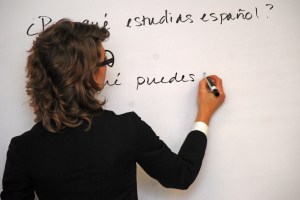TEACHING PHILOSOPHY
I believe that every student can learn to speak a foreign language, given the opportunity to apply their communication skills in conversation with Spanish speaking individuals on a regular basis. Through the experience of communicating effectively with a native speakers by listening for cues and responding accordingly, students realize that language learning shares qualities with other interactive and performative arts (such as theater, music, dance, and team sports) that require communication, collaboration, and creativity in working toward a common goal.
My communicative approach draws on the 21st Century Skills as a theoretical framework in developing assignments, assessments, and cultural activities that challenge students to improve their skills and apply them in conversation. I concur with ACTFL and the Partnership for 21st Century Skills in their assertion that the goals of language programs should be to “develop students’ language proficiency around modes of communicative competence reflecting real life communication” and provide students with ample opportunities to compare and contrast perspectives and beliefs with individuals from other cultures in the target language. Second language skills are of critical importance to students who aspire to careers in education, the humanities, business, health, law, social services almost any professional field that recruits or serves Spanish speaking clients. Spanish skills are not only a necessity when serving individuals with limited English; mastery of a second language fosters communication with individuals from diverse cultures and perspectives and gives job seeking professionals an edge over monolingual competition.
As faculty at the University of North Georgia, I used this approach to create a communicative and project-based curriculum for a Medical Spanish course and a Spanish language immersion program on our campus. These courses use a variety of techniques to promote communicative competency through improvisational theater exercises, ethnographic interviews, and interactive cultural activities led by native speakers to prepare students for encounters with Spanish speaking patients as healthcare professionals and to better integrate themselves in the host culture during Study Abroad experiences. The inevitable friendships and professional relationships that come from these encounters are a key factor in motivating students to learn Spanish, continue to take Spanish courses, and travel abroad.
